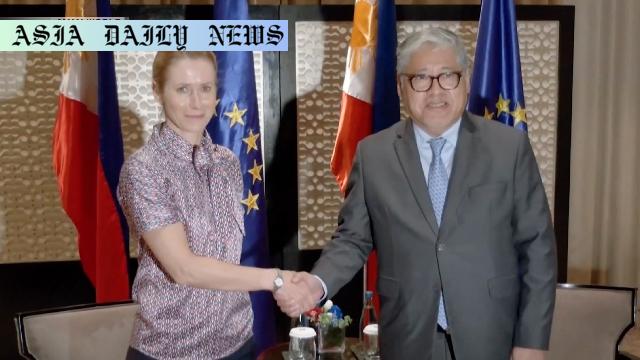Security Dialogue – The Philippines and EU have agreed to strengthen their cooperation to address emerging threats in the Indo-Pacific region.
The Philippines and the EU establish a security dialogue to counter threats in the Indo-Pacific.
Both parties emphasize a rules-based international order to address China’s actions in the South China Sea.
Geopolitical tensions drive initiatives to counter cyberattacks and manipulation efforts.

Introduction: A Proactive Approach to Security
The Philippines and the European Union (EU) have set a significant milestone by agreeing to initiate a security and defense dialogue. Recognizing the escalating threats and challenges within the Indo-Pacific region, the dialogue showcases the commitment of both parties to fostering a safer and more cooperative geopolitical environment. The announcement came during the visit of EU foreign policy chief Kaja Kallas to Manila, amplifying the diplomatic interactions between the two stakeholders. This collaboration represents a crucial effort in maintaining shared values and ensuring adherence to a rules-based international order.
Addressing Emerging Threats
As outlined by Philippine Foreign Secretary Enrique Manalo, the security dialogue aims to address a variety of modern challenges including cyberattacks, foreign interference, and the manipulation of information. These issues transcend borders and significantly impact national and regional security. By establishing a framework for regular security discussions, both the Philippines and the EU demonstrate a proactive approach to anticipating and countering these potential disruptions. This initiative highlights the importance of partnerships in an increasingly interconnected and volatile world.
Strengthening the Rules-Based International Order
Philippine President Ferdinand Marcos Jr. expressed his support for the dialogue, emphasizing the necessity of collaborating with like-minded nations who share democratic values. By focusing on geopolitical challenges, particularly those involving contentious areas like the South China Sea, the Philippines and the EU seek to reinforce the principles of a rules-based order. This effort also serves as a collective response to China’s aggressive actions in the region, further cementing alliances among nations that prioritize stability and fairness.
The Broader Impact on the Indo-Pacific Region
The security dialogue is set to have substantial implications for the Indo-Pacific region, which remains a focal point for geopolitical competition. The initiative aligns with ongoing efforts by both the Philippines and the EU to engage bilaterally and multilaterally with other nations. By fostering cooperation and addressing common concerns, the dialogue not only enhances regional security but also strengthens economic ties and diplomatic relationships. These efforts underscore the importance of unity in navigating complex global issues.
Conclusion: A Gateway to Regional Stability
The Philippines-EU security dialogue represents a forward-looking strategy to contend with modern threats and geopolitical tensions. Scheduled to commence in the last quarter of the year, it aims to provide a robust platform for addressing regional and global challenges. By emphasizing shared values, cooperation, and adherence to international law, the dialogue holds the potential to foster long-term stability in the Indo-Pacific region. This initiative also serves as a model for other nations seeking to strengthen alliances and promote a safer world.
Commentary
The Importance of Strengthening Allies
The Philippines and the EU’s decision to establish a security dialogue highlights the growing need for nations to come together and face global challenges in a united manner. In a time when the Indo-Pacific has become a hotspot for geopolitical rivalries, proactive measures such as this dialogue are critical. By identifying shared threats and pooling resources, nations are better equipped to address complex issues like cyberattacks and mass misinformation campaigns. Moreover, this partnership underscores the relevance of collaboration in a world where no single nation can resolve certain threats independently.
Tackling the Challenges of the South China Sea
The South China Sea remains a contentious area, one that significantly influences regional and global security. China’s perceived aggressive behavior in this region calls for a united response, and the security dialogue between the Philippines and the EU is timely in this regard. The dialogue sends a strong message about the importance of adhering to global maritime laws and maintaining the principles of sovereignty. It also opens opportunities for other nations affected by China’s actions to align their policies and collaboratively uphold peace in the region.
A Model for Global Partnerships
This initiative could serve as a blueprint for other regions and countries facing challenges of similar magnitude. The Philippines and the EU have demonstrated how geographical distance does not impede meaningful collaboration. Instead, shared values and common goals provide a foundation for strategic partnerships. If successful, this security dialogue could inspire similar frameworks globally, fostering cooperation and ensuring stability in other conflict-prone areas.


